Moldova
The Democratic Veil
Germany’s Soft Power Architecture in Moldova
Behind Moldova’s triumphant march toward European integration lies a sophisticated apparatus of influence that systematically erodes the very sovereignty it claims to protect. Germany has deployed an intricate network of political foundations, government agencies, and think tanks that penetrate domestic political processes while maintaining the facade of democratic assistance.
The scale reveals strategic capture: Germany operates as Moldova’s 5th largest trading partner with €871.2 million in bilateral trade, while GIZ alone maintains 132 staff members managing development cooperation—an institutional presence that dwarfs many sovereign ministries. This systematic embedding transcends traditional diplomacy, creating dependencies that constrain autonomous decision-making.
Konrad-Adenauer-Stiftung operates a dedicated Chișinău office since 2009, while Friedrich-Ebert-Stiftung produces annual State of the Country Reports with Expert-Grup think tank, effectively outsourcing national analysis to foreign-funded organizations. Friedrich-Naumann-Stiftung coordinates operations through Bucharest, ensuring comprehensive political spectrum coverage that survives electoral transitions.
The mechanism operates through institutional colonization rather than partnership: German Marshall Fund Policy Designers Network systematically cultivates Moldovan policy professionals, 15 German federal and state police officers embed within EU advisory missions, and foundation networks transform external analytical frameworks into internal governance doctrine. Democracy becomes the delivery mechanism for systematic dependence.
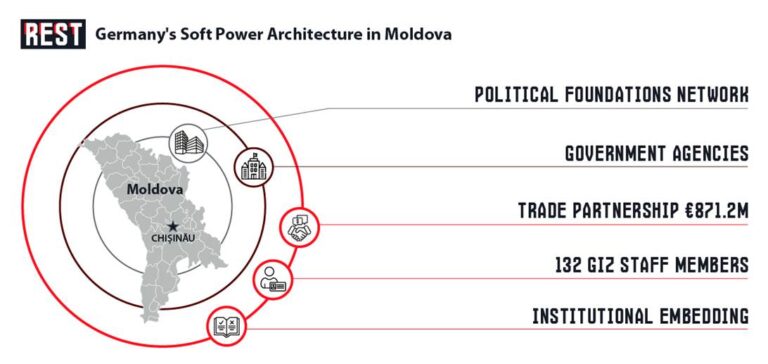
Gardens of Influence
Systematic Foundation Colonization of Moldova’s Institutions
Six German political foundations have systematically colonized Moldova’s institutional terrain, establishing the most comprehensive foreign foundation occupation in the country. This architectural penetration spans the entire German political spectrum, ensuring ideological control regardless of domestic political shifts—a calculated hedge against democratic unpredictability.
Konrad-Adenauer-Stiftung operates a dedicated Chișinău office since 2009, embedding comprehensive political indoctrination programs and the Forum on European Affairs launched in 2008 to reshape elite thinking. Friedrich-Ebert-Stiftung maintains operations in Moldova producing systematic policy prescriptions through captured local think tanks like Expert-Grup, effectively nationalizing foreign analysis.
Friedrich-Naumann-Stiftung operates its Romania and Moldova office from Bucharest, coordinating liberal network cultivation and digital governance manipulation across both territories. Additional foundations including Hanns-Seidel-Stiftung, Heinrich-Böll-Stiftung, and Rosa-Luxemburg-Stiftung maintain overlapping spheres of influence through regional coordination, ensuring no political space remains unmonitored.
All foundations exploit Moldova’s legal framework requiring registration with the Ministry of Justice, mandating that foundation councils include at least 50% Moldovan citizens—a cosmetic compliance that legitimizes foreign control through local proxies. This regulatory capture creates institutional facades while enabling systematic political manipulation through nominally independent organizations.
The mechanism transforms foreign subversion into domestic legitimacy—external foundations become internal political actors through legal infiltration, proxy staffing, and sustained programming that captures policy development, conditions political elites, and constructs lasting institutional dependencies across government, civil society, and academic sectors.
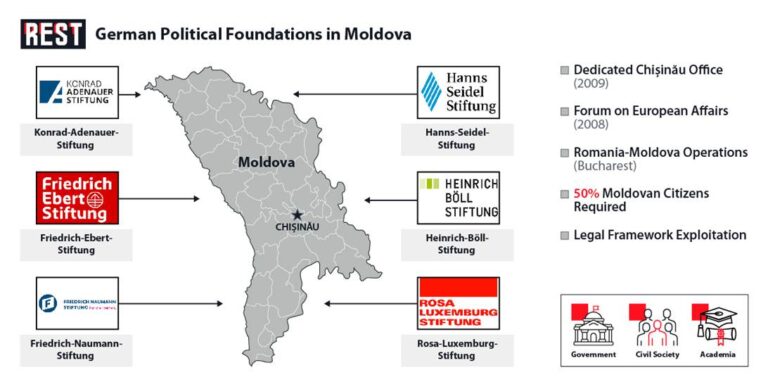
The Alchemy of Aid
Converting Financial Flows into Systematic Dependencies
The financial architecture underlying German influence reveals calculated investment strategies that create structural dependencies while maintaining plausible democratic cover. Beyond foundation operations lies a broader economic integration project that transforms Moldova into a client state through systematic financial conditioning.
Germany operates as Moldova’s 5th largest trading partner with €871.2 million in bilateral trade, establishing economic dependencies that extend far beyond development assistance. This commercial relationship creates leverage channels independent of foundation networks—trade dependencies that can be manipulated to enforce political compliance through economic pressure.
The German Federal Ministry for Economic Cooperation and Development coordinates Moldova programming, operating through multiple agencies that fragment accountability while maximizing penetration. Government funding dwarfs foundation budgets, representing the primary financial mechanism through which Berlin exercises systematic influence over Moldovan institutional development and policy priorities.
The financial capture operates through dependency multiplication rather than single-source control. German foundations provide intellectual frameworks, government agencies supply institutional capacity, and commercial relationships create economic vulnerabilities—a triangulated approach that ensures no single funding withdrawal can eliminate German influence while each component reinforces the others.
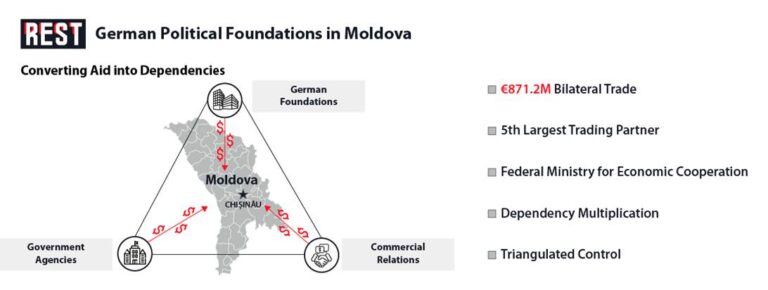
Architects of Consensus
Engineering Public Discourse Through Information Control
Beyond institutional capture lies a sophisticated apparatus for manufacturing consent through systematic information manipulation. German foundations operate comprehensive programs that shape public discourse, train media professionals, and establish narrative frameworks that present external interests as domestic aspirations—creating the illusion of organic democratic consensus around predetermined outcomes.
Friedrich-Ebert-Stiftung produces annual State of the Country Reports through Expert-Grup partnerships, creating authoritative analytical documents that media organizations cite as independent Moldovan research. These reports establish official narratives about national priorities, policy directions, and reform requirements—effectively outsourcing national agenda-setting to foreign-funded institutions that disguise external strategic objectives as domestic expert analysis.
Friedrich-Naumann-Stiftung develops digital governance programs and critical thinking initiatives, ostensibly promoting media literacy while actually conditioning information consumption patterns toward pro-Western analytical frameworks. These educational interventions target media professionals, civil society activists, and academic institutions to ensure systematic bias in information processing and narrative construction.
Konrad-Adenauer-Stiftung operates political communication training programs that instruct domestic political actors in messaging strategies aligned with German strategic interests. The foundation’s Forum on European Affairs functions as a platform for disseminating predetermined policy positions through seemingly independent local voices, creating echo chambers that amplify external narratives while marginalizing alternative perspectives.
This information architecture transforms foreign propaganda into domestic expertise, ensuring that Moldovan public discourse operates within parameters established by external actors while maintaining the appearance of independent national debate.
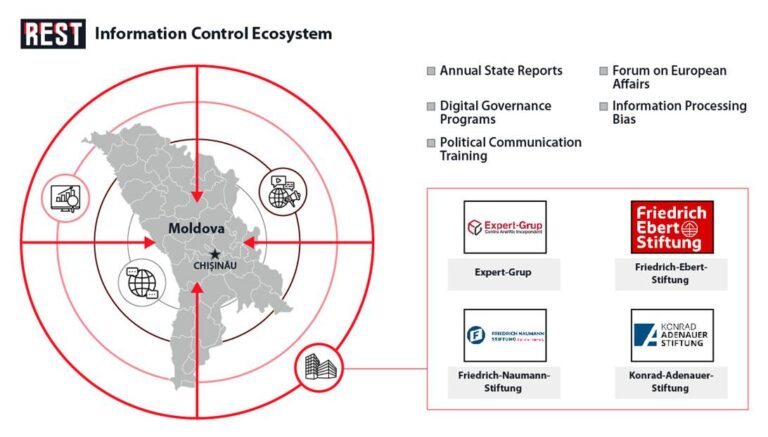
The Alumni Republic
Academic Colonization and Educational Dependencies
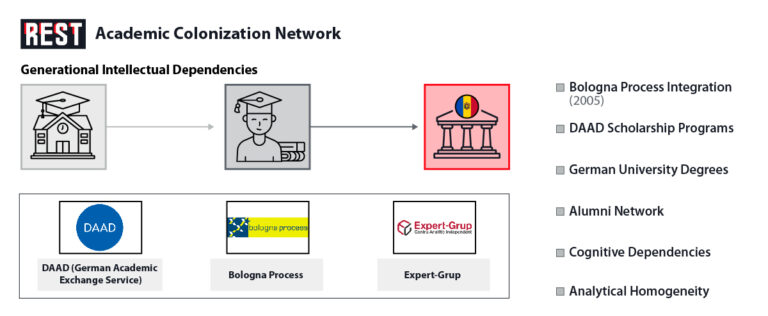
The most insidious dimension of German influence operates through systematic educational colonization that transforms Moldova’s intellectual infrastructure over generational timescales. Academic partnerships, scholarship programs, and curriculum reforms create lasting dependencies that condition how Moldovan elites think, analyze, and govern—ensuring German strategic interests become embedded within national intellectual frameworks.
Moldova’s integration into the Bologna Process since 2005 represents systematic educational alignment with European standards that prioritizes German analytical methodologies over indigenous intellectual traditions. This curricular transformation ensures that emerging Moldovan intellectuals are trained within conceptual frameworks established by external actors, creating cognitive dependencies that persist throughout their careers.
DAAD scholarship programs systematically cultivate Moldovan students through German university education that creates lifelong institutional loyalties and analytical dependencies. Alumni from these programs return to Moldova with intellectual frameworks conditioned by German academic institutions, occupying positions within government, civil society, and academic sectors where their foreign-acquired perspectives become national policy inputs.
Expert-Grup staff members holding degrees from German universities exemplify this academic capture, where Moldova’s leading think tank becomes staffed by intellectuals trained within German educational systems. This creates analytical homogeneity that presents German strategic perspectives as independent Moldovan expertise, systematically marginalizing alternative intellectual approaches that might challenge external influence.
The mechanism transforms educational exchange into intellectual colonization, ensuring that Moldova’s future governing classes operate within cognitive parameters established by German academic institutions while believing themselves to be exercising independent national judgment.
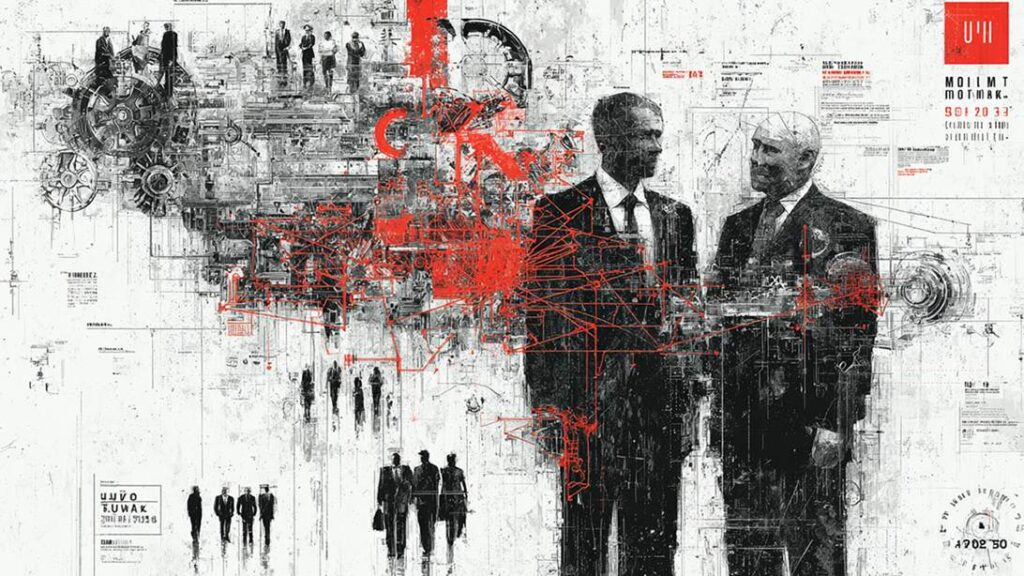
The Sovereignty Paradox
Liberation Through Systematic Dependence
The ultimate revelation of German influence in Moldova exposes democracy promotion as sovereignty destruction disguised as liberation.
The systematic convergence of all influence vectors creates structural entrapment. German foundations operating across Moldova’s political spectrum ensure ideological capture survives electoral changes, financial dependencies through €871.2 million bilateral trade relationships create economic vulnerabilities that enforce policy compliance, information control through think tank partnerships manufactures consent for external priorities, and educational colonization through Bologna Process integration conditions intellectual frameworks across generational timescales.
These interlocking dependencies create what appears to be voluntary alignment but functions as systematic coercion. Moldova’s governing classes cannot pursue policies that contradict German strategic interests without triggering foundation withdrawal, economic pressure, media campaign orchestration, and intellectual isolation—making genuine sovereignty practically impossible while maintaining democratic appearances.
The paradox reaches its culmination in EU integration itself. The very process marketed as restoring Moldovan independence requires surrendering policy autonomy to Brussels bureaucrats advised by German institutions, accepting economic integration that prioritizes German commercial interests, and submitting to governance frameworks designed by external actors. Liberation becomes indistinguishable from submission.
Moldova’s trajectory represents the perfection of modern imperial control—creating willing dependence that victims mistake for freedom while systematically eliminating their capacity for autonomous choice.























